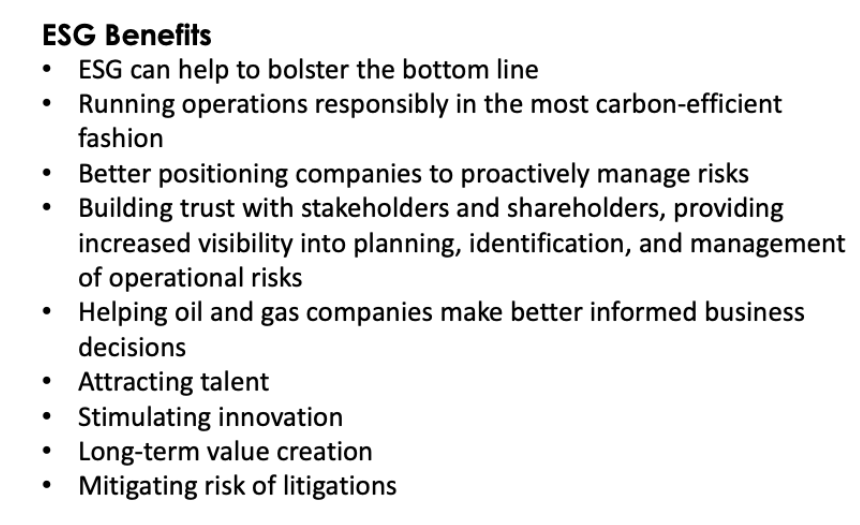Benefits of ESG
ESG (Environmental, Social, and Governance) has gained significant traction in recent years as companies recognize the importance of sustainable practices. In this article, we delve into the numerous benefits that ESG can bring to businesses, society, and the environment. By implementing ESG principles, companies can not only enhance their reputation but also drive long-term success.
Enhanced Corporate Reputation
One of the key advantages of embracing ESG is the positive impact it can have on a company’s reputation. By prioritizing environmental sustainability, social responsibility, and strong governance practices, organizations can build trust and credibility with stakeholders. This, in turn, can attract investors, customers, and talented employees who align with the company’s values.
Improved Financial Performance
Contrary to the misconception that ESG initiatives are costly, studies have shown that companies with strong ESG performance tend to outperform their peers financially. By integrating sustainability into their business strategy, companies can identify new revenue streams, reduce costs through energy efficiency, and mitigate risks associated with environmental and social factors. This long-term approach to financial management can lead to enhanced profitability and resilience.
Reduced Operational Risks
ESG practices help companies proactively identify and manage operational risks. By conducting thorough environmental impact assessments, companies can minimize their carbon footprint and decrease exposure to regulatory fines. Additionally, by promoting social inclusivity and diversity, organizations can mitigate potential reputational risks and foster a more inclusive work environment.
Access to Capital
Investors are increasingly considering ESG factors when making investment decisions. Companies that prioritize ESG are more likely to attract sustainable investment funds, which are growing in popularity. By integrating ESG practices, businesses can access a broader range of capital options, including green bonds and socially responsible investment funds, thereby diversifying their funding sources.
Attracting and Retaining Talent
ESG-focused companies are known to attract top talent who are passionate about making a positive impact. By demonstrating a commitment to sustainability, organizations can create a purpose-driven culture that appeals to employees seeking meaningful work. Moreover, companies that prioritize employee well-being, diversity, and inclusion can foster a more engaged and motivated workforce, leading to higher productivity and reduced turnover.
Positive Customer Perception
In an era where consumers are increasingly conscious of their purchasing decisions, companies with strong ESG practices can benefit from a positive customer perception. By aligning with customers’ values, businesses can differentiate themselves from competitors and build brand loyalty. Studies have shown that consumers are more likely to support companies that prioritize sustainability, leading to increased market share and customer satisfaction.
Contributing to Sustainable Development
By embracing ESG, companies play a crucial role in driving sustainable development. Through responsible environmental practices, organizations can help conserve natural resources, combat climate change, and protect biodiversity. Socially responsible initiatives, such as community engagement and philanthropy, can contribute to the well-being of local communities. By integrating ESG principles, businesses become agents of positive change.
ESG is not just a trend; it is a strategic approach that can unlock sustainable success for businesses. By prioritizing environmental, social, and governance factors, companies can enhance their reputation, improve financial performance, mitigate risks, attract capital and talent, and contribute to sustainable development. Embracing ESG is not only a responsible choice but also a smart business decision in today’s rapidly evolving world.

Frequently Asked Questions about Benefits of ESG
1. What is ESG?
ESG stands for Environmental, Social, and Governance. It refers to a set of criteria used to evaluate a company’s performance in these areas.
2. How does ESG benefit investors?
Investing in companies with strong ESG practices can lead to better long-term financial performance and reduced risk for investors.
3. What are the environmental benefits of ESG?
ESG encourages companies to reduce their carbon footprint, conserve resources, and promote sustainable practices, resulting in a positive impact on the environment.
4. How does ESG contribute to social well-being?
Companies with strong ESG practices prioritize fair labor practices, diversity and inclusion, community involvement, and ethical supply chains, leading to improved social well-being.
5. What role does governance play in ESG?
Good governance ensures transparency, accountability, and responsible decision-making within a company, which ultimately benefits shareholders and stakeholders.
6. Can ESG help attract and retain talent?
Yes, companies with strong ESG practices are often more attractive to top talent, as employees are increasingly drawn to organizations that align with their values and have a positive impact.
7. How does ESG influence customer perception?
Consumers are more likely to support and trust companies that demonstrate strong ESG practices, which can enhance brand reputation and customer loyalty.
8. Are there any regulatory advantages to implementing ESG?
Some countries and regions provide regulatory incentives or requirements for companies to adopt ESG practices, which can lead to compliance advantages and access to certain markets.
9. Can ESG contribute to long-term business sustainability?
A focus on ESG factors helps companies identify and manage risks, adapt to changing market conditions, and build resilience, contributing to long-term business sustainability.
10. How can investors incorporate ESG into their investment strategies?
Investors can consider ESG ratings and data, engage with companies on ESG issues, and invest in ESG-focused funds or portfolios to incorporate ESG into their investment strategies.




